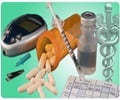New web-based risk calculator can predict if a type 2 diabetes and obesity patient will die or develop serious complications including a heart attack, heart failure and diabetic kidney disease within the next 10 years.

‘New web-based risk calculator can predict if a type 2 diabetes and obesity patient will die or develop serious complications including a heart attack, heart failure and diabetic kidney disease within the next 10 years depending on whether they had bariatric surgery or continue with standard medical treatment.’
Read More..




Studies have shown that for most patients with obesity, metabolic surgery, which includes procedures such as sleeve gastrectomy and gastric bypass, is superior to medical therapy in improving type 2 diabetes and in lowering the risk of heart attacks, strokes and other major adverse cardiovascular events. Read More..
According to a recent study in the Journal of the American Medical Association by researchers at the Cleveland Clinic, patients who had metabolic surgery were 39 percent less likely to experience a heart-, stroke-, or diabetic kidney-related complication and 41 percent were less likely to die from any cause.
The study compared the outcomes of 13,722 patients with type 2 diabetes and obesity (2,287 metabolic surgery patients and 11,435 closely matched patients who were eligible for surgery but received standard medical therapy).
Now these same researchers have taken this data and in a new study identified the factors that contribute to four potential adverse outcomes from diabetes -- death, cardiovascular event, heart failure and diabetic kidney disease.
Using rigorous statistical analysis and machine learning, accurate prediction models were created and integrated into the new Individualized Diabetes Complication (IDC) Risk Calculator, which provides a 10-year personalized risk score if a patient continues his or her current treatment or undergoes metabolic surgery. The risk calculation is made based on a combination of variables including the patient's age, medical history, body mass index, diabetes control, and medication usage.
Advertisement
The IDC Risk Calculator is available in the Cleveland Clinic Risk Calculator Library and may also be downloaded as an app for Android and iOS (BariatricCalc).
Advertisement
"The IDC Risk Calculator is an important evidence-based tool to help patients considering metabolic surgery understand the risks and benefits of surgical treatment and the impact it can have on their health," said Eric J. DeMaria, MD, President, ASMBS and Professor and Chief, Division of General/Bariatric Surgery, Brody School of Medicine, East Carolina University Greenville, NC, who was not involved in the study. "Greater understanding may lead to more utilization for a treatment that has been shown to improve diabetes in nearly 90 percent of patients and put it into remission in about 70 percent of people."
According to the ASMBS, about 228,000 bariatric or metabolic surgeries were performed in 2017 in the U.S., which is less than 1 percent of the population with severe obesity. Metabolic/bariatric surgery has been shown to be the most effective and long-lasting treatment for severe obesity, resulting in significant weight loss and resolution or improvements in diabetes, heart disease, sleep apnea and many other obesity related diseases.
The safety profile of laparoscopic bariatric surgery is comparable to some of the safest and most commonly performed surgeries in the U.S., including gallbladder surgery, appendectomy and knee replacement.
The U.S. Centers for Disease Control and Prevention (CDC) reports 93.3 million or 39.8 percent of adults in the U.S. had obesity in 2015-2016. The ASMBS estimates about 24 million have severe obesity, which for adults means a BMI of 35 or more with an obesity-related condition like diabetes or a BMI of 40 or more. Obesity is linked to more than 40 diseases including type 2 diabetes, hypertension, heart disease, stroke, sleep apnea, osteoarthritis and at least 13 different types of cancer.
Source-Eurekalert















